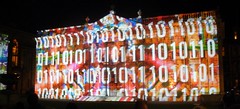January 23, 2009
The audacity of safety
 Seems our paper is in the news again: How do we know the LHC really is safe? in New Scientist. They seem to get our argument right.
Seems our paper is in the news again: How do we know the LHC really is safe? in New Scientist. They seem to get our argument right.
It is especially fun that NS writes about it right now since this paper just arrived on arXiv. It shows that under some warped brane world theories (i.e. very speculative physics we have no evidence for) black holes can evaporate much more slowly than expected. It also shows that they still won't have the chance to grow dangerously in Earth (and all the previous cosmic ray arguments, Dar's supernova argument and Mangano's argument about dense stars also hold, of course). Not that that is going to calm the usual suspects or sensationalist journalists. But it does demonstrate how hard it is to make a "rock solid" argument.
What surprisingly many people seem to have trouble with is the idea that one can speak of the probability that a theory is correct. Yes, presumably there is a true mechanism of quantum gravity out there and any particular theory we make is either right or wrong. But that is a bit like saying that there is a true winning lottery number out there, and tickets are either winners or losers. What we usually care about is the fraction of winning versus losing tickets. In the case of theories we are also more interested in how many of them are adequate for reaching a certain conclusion. Also, what our paper deals with is the probability of arguments being correct, which not just includes the chance of the underlying theory being adequate but also that calculations are correct etc. This is something we can actually put bounds on based on past experience, and hence get a rough estimate of how certain we should be about our arguments.
We actually estimate the likelihood of arguments being right every day. When somebody claims we should do this because of that, we adjust ourselves based on how plausible the argument sounds and the past reliability of the person. It is not different in science or when dealing with global disasters. It is just that we get unusually high sensitivity to uncertainty when probabilities are extremely low and stakes high. However, public reactions to LHC safety arguments show that other cognitive biases can easily overshadow the rational concerns.
Posted by Anders3 at January 23, 2009 10:29 PM